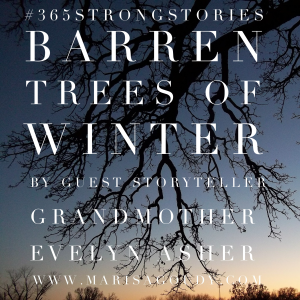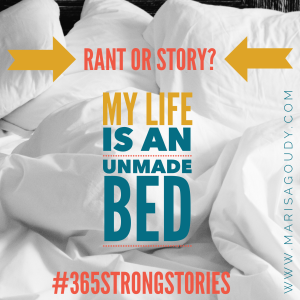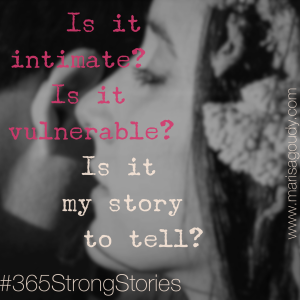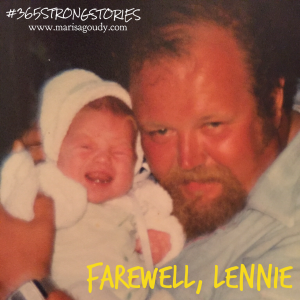
BLOG
Echo Grandma by Guest Storyteller Evelyn Asher
 As my thoughts propel through barren trees, the chill of a Northern Georgia winter diminishes. My heart travels on wings of love across four states to northwest Ohio where I picture two of my granddaughters, ten year-old Nora and 8 year-old Samantha, fastening their seat belts in their dad’s dated van. Off these resilient young ladies go to their hip hop and jazz dancing lessons while their same-aged stepbrothers are scurried in another direction.
As my thoughts propel through barren trees, the chill of a Northern Georgia winter diminishes. My heart travels on wings of love across four states to northwest Ohio where I picture two of my granddaughters, ten year-old Nora and 8 year-old Samantha, fastening their seat belts in their dad’s dated van. Off these resilient young ladies go to their hip hop and jazz dancing lessons while their same-aged stepbrothers are scurried in another direction.
My younger son, 49, a bearded bear and a vivid storyteller, fosters fierce grandparent bonds and tends a family legacy. He remains in the frigid north to ensure he is an integral, stable part of his daughters’ lives.
“Hi, Grandma Asher.” I melt when these words greet me each time they phone.
“What are you doing this afternoon?” I ask when the girls called to thank me for coloring books. “We are going to Poppy’s. He isn’t feeling well.”
Tonight, I will craft a “C” poem on decorative paper and I will post tomorrow for weekend receipt. Enclosed will be two sheets of paper, suggested letters of the alphabet for a poem written in different script, and two self-addressed stamped envelopes. I delight in creating a collage of the girls’ poems and sweet notes that come back to me- sunshine in my mailbox.
When distance-induced heartache surfaces, I giddily send surprise packages. Sometimes I compose “fill-in-the-blank” letters and send them off - also with a SASE. I have learned to ask at the end of each letter, “What haven’t I asked you that you would like to tell me?” About my new haircut, one tells me.
At other times, my heart spills over in when I meet a young mother in the check-out line and ask how old her child is. I recently asked a mom at Michael’s if I could treat her child to something extra as I would if I my grandchildren were near. Gratefully, I had that pleasure.
Dance recitals are calendared for June. Will I be in the audience? Perhaps. Whether I make the drive or not, I will always be in my granddaughters’ balcony, cheering them on.
Through the barren trees, my echo carries. Can you hear me now? Can you hear me now?

Evelyn Asher is a business coach and poet who yearns to take her family on a Custom Sailing cruise.
Is That a Rant or a Story?
 This morning as I rushed from room to room gathering necessary clothes and snacks and computer accessories and toys, it occurred to me:
My house is like an unmade bed.
This morning as I rushed from room to room gathering necessary clothes and snacks and computer accessories and toys, it occurred to me:
My house is like an unmade bed.
I was tangled in the twisted bed clothes of an entire household of stuff. Everything I needed was lost in this riot of a rumpled nest and it felt nearly impossible to meet the day.
This blistering tirade fueled my mad dash (because, of course, one girl had to make the bus and another had to be dropped at playgroup exactly on time so that mama could make her daylong VIP session with a client).
Once I was safely belted into a quiet car with my coffee, I began composing the day’s story in my head, so pleased that I had such a powerful image and title. But then I paused.
Was I a storyteller or a cranky woman who just wanted to score some sympathy points for performing the impossible? (At this point, I realized that I wasn’t a righteous super hero. I would probably just sound like a disorganized creature who, though hilariously human, was also a trifle whiny.)
Do you want to entrance them with story or blind them with shared rage?
A strong story is compelling. It moves the reader to say “me too!” and click share. Of course, the same can be true in the case of a red hot rant that pushes your audience’s buttons.
But one of these is likely to be full of gory details that you don’t want to revisit or defend in conversation. It’s about a topic that’s too intimate, too raw, too prone to morning after regret.
When you think about it that way, if you’re writing to build your business and establish your professional reputation, you want to avoid that kind of TMI like the plague.
An authentic blog post is intended to give people a window into your world, but the goal is to hold onto a few shreds of dignity and authority so that readers will say “I want to work with that human.”
A story is a well processed piece of prose that features a beginning, a middle, and an end. It has a conflict and a resolution and a protagonist you can root for.
When you write a story, you want to be vulnerable, but you’re not yowling about an open wound like you might in a full blooded rant. Instead, you’re showing off your healed scars with a smile.
How do you know when your post is more diatribe than engaging story?
A rant doesn’t have a strong ending. It may not even have a clear beginning. It’s all messy middle as far as your harangue colored glasses can see.
There’s plenty of conflict, but resolution hides below the horizon of a limitless sea of indignation.
Now, your rant may have characters - generally the wounded party (who may or may not be you, the writer) and the evil perpetrator (an actual villain or just the beasts of excess and chaos). In your unfiltered narrative, you might not be able to make your hero likeable enough to root for. An angry victim will boil alone in her vitriol if she doesn’t have a plot to hold her and prove her case.
Ask yourself: how do I want to connect?
We live in the age of storytelling, not in the age of tirades.
Ok, so that is a total lie seeing as we are living through an American presidential campaign, but we really are in a golden age of storytelling when we get to market our businesses not through newspaper ads but through content that connects.
An emotional explosion might bring the right people through your door. But, most often, those rants will fall flat and keep keep your ideal clients at arm’s length. How can they see the solutions you offer through the drama you describe?
Write stories, not rants. Your readers and your business will thank you for it.
Need some help telling a story that connects? Download your free strong storytelling guide now.
Is it intimate? Is it vulnerable? Is it my story to tell?
 Writing a story a day is a mad, marvelous mission. Time constraints and the very real limitations on creative energies are valid concerns that might make you quit before you begin.
Another reason to think twice about asking your creative impulses to take the shape of something that can be fully expressed within a twenty-four hour period: the strong stories often want to take a lot longer to be conceived, born, and debuted in this strange, complex world.
Writing a story a day is a mad, marvelous mission. Time constraints and the very real limitations on creative energies are valid concerns that might make you quit before you begin.
Another reason to think twice about asking your creative impulses to take the shape of something that can be fully expressed within a twenty-four hour period: the strong stories often want to take a lot longer to be conceived, born, and debuted in this strange, complex world.
After two months of shaping and sharing these stories, I have finally started to recognize a story that needs to germinate. It would be a disservice to the narrative, the reader, and to me as a writer to force a certain kind of story to sing and perform before it can even cry out its own name.
When you force yourself to work on a deadline, however, it’s nearly impossible to abandon a story that’s three quarters written - especially if it took more than the hour you told it that it deserved.
Today, I wrestled with a story for a couple of hours only recognized that we both needed a rest when it bloomed past the 800 word mark. In a few days, I might be able to tell you if it was a lost cause journal entry with delusions of grandeur or if it’s something real and important that wants to reach beyond the scope of #365StrongStories.
How can you tell if your story needs to be nurtured in secret or if needs to be shoved (lovingly) into the light?
First, follow Brene Brown’s wisdom: is the story intimate or is it vulnerable?
Is the story full of gory details that you don’t want to describe or defend in conversation? That’s too intimate to share.
Or do you feel brave and proud and just the right amount of scared? That’s vulnerability and that’s at the core of every strong story.
And second, ask yourself whether it is your story to tell. If neither intimacy or vulnerability seem relevant to the equation, your story might be asking you to dive deeper or revisit it when you’ve really got something to say.
Sticky subjects that might stink of shame
The story I’m not ready to tell is about parent shaming. I’m very much inspired by Mercedes Samudio’s #EndParentShame work and I was triggered by an exchange I saw in a Facebook group today. It’s such an important topic that we need to start talking about across our communities.
Thing is, I felt nauseated rather than exhilarated as my fingers flew across the keyboard. I think I was more of a voyeur than an ethical memoirist describing her experiences.
All of those are signs that I’m sharing the wrong details about the wrong aspect of a greater truth. You, my story, and my integrity as a storyteller deserve more.
If it’s a strong story, it will wait.
It's my mission to help you discover and tell the strong stories that matter to you, your audience, and your business. Learn more about the You, Your Stories, and Your Audience eCourse.

The everyday anguish of a creative life left unlived
 “There is no greater agony than bearing an untold story inside of you.”
The girl had grown up reading that quote, an amateurish watercolor on a piece of torn paper that was tacked to her aunt’s kitchen wall.
“There is no greater agony than bearing an untold story inside of you.”
The girl had grown up reading that quote, an amateurish watercolor on a piece of torn paper that was tacked to her aunt’s kitchen wall.
“Auntie? Why do you have that old piece of paper up there, way up high?”
The woman sighed deeply and looked into her mug of tea. Childhood went by faster than ever, but there were certain stories that wouldn't fit into a six year-old’s world.
“The writer who said that - can you read where it says ‘Maya Angelou’? She changed the world by writing the stories of her own life. She was a poet who talked with presidents and she had a deep, powerful voice.”
This was when the woman began to pray, please let that be enough. When her niece came to visit her tiny apartment in this blah bedroom community, every inch of the place was examined, so she ought to have expected this question.
“Yeah, but why is it way up there by the ceiling?”
Because I needed it to be there, but not there, the woman screamed silently. The truth behind this painting was too important to lie about and yet too raw to speak aloud.
“I hung it way up there so I had something to look at when I do my neck exercises.” That was a sad attempt an explanation. On the bright side, maybe that lame little story would remind her to stretch now and again.
“Did you paint it?”
“Yes, honey, I did.”
“But you’re not a artist!” the girl exclaimed, skipping over that cumbersome “n” in her passion.
“No, honey, I’m somebody in a cubicle.”
Apparently cubicles weren't interesting to children either. “Yeah, but what does ‘agony’ mean” she asked, making the word sound like it rhymed with pony.
“Something that really hurts.”
“Oh, ok. I don’t have that. I tell all the stories in my heart.”
The nice thing about being cross-examined a first grader is that you can pull her onto your lap and rest your chin on her head so she cannot see the tears in your eyes.
Tell the stories that matter to you. Learn how to access them with this quick, free guide for creative entrepreneurs.
My Buddy Lennie
 “A small, redheaded girl from Centerville was a crowd favorite.”
I’m not exactly sure that’s what the Cape Cod Times review said, but I can’t seem to find the clipping from the summer of 1985. I do remember my mother read it to me over breakfast while I wore my gold medal - a piece of cardboard covered with the band members’ autographs.
“A small, redheaded girl from Centerville was a crowd favorite.”
I’m not exactly sure that’s what the Cape Cod Times review said, but I can’t seem to find the clipping from the summer of 1985. I do remember my mother read it to me over breakfast while I wore my gold medal - a piece of cardboard covered with the band members’ autographs.
The night before, I had won Sha Na Na’s “Monster Mash” contest during their concert at the Melody Tent. I’m not sure the other contestants had a chance - it’s pretty easy to limbo under a plastic leg held by a man dressed as Frankenstein when you’re not even four feet tall.
Perhaps I was picked from the crowd because I was the only kindergartener in the place or maybe it was because my parents had known saxophonist Lennie Baker from back in their days working in the saloons of Falmouth, MA. Either way, it seemed like a perfectly ordinary - albeit wonderful - occurrence. Doesn’t every kid get to go on stage with the band from Grease and land in the papers?
I’d known that my parents used to hang out with the big redhaired guy on TV (remember when Sha Na Na had their own show?) and there were pictures of him holding me in my baby album. The only story my folks told about him his version of a diet - a six pack of light beers and a lettuce sandwich. That one anecdote certainly that doesn’t sum up their friendship or Lennie’s life. Then again, his obituary in the New York Times doesn’t either.
RIP Lennie. I can say "I knew you when," but that's more legend than fact.
